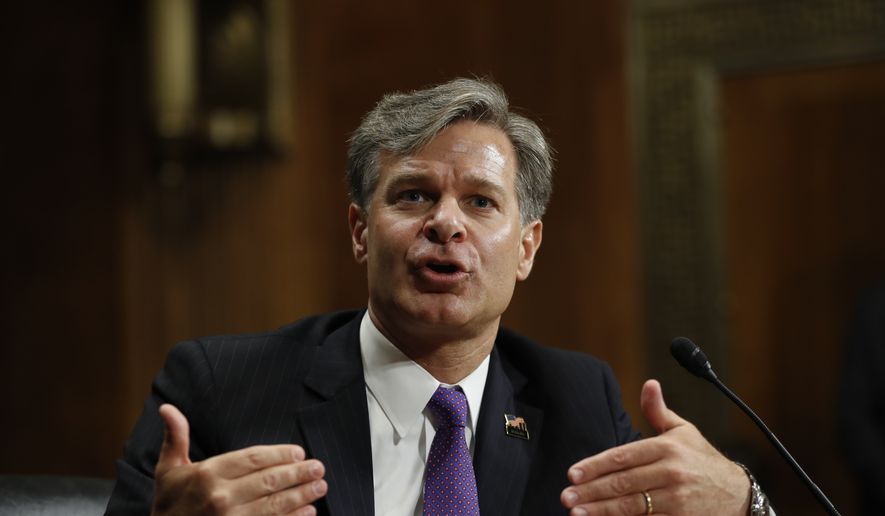The White House has not tried to interfere in the ongoing probe of Russian meddling in last year’s presidential election, new FBI Director Christopher Wray said Thursday in his first public appearance since taking the job.
“I can say very confidently I have not detected any whiff of interference in that investigation,” Mr. Wray said.
The new director, speaking alongside intelligence community leaders at a security conference in Washington, D.C., also made a plea for Congress to renew the Foreign Intelligence Surveillance Act’s Section 702 snooping powers.
Section 702 allows warrantless surveillance of communications of foreigners located outside the U.S. Mr. Wray said those powers, which are due to expire at the end of this year unless Congress extends them, are critical to detecting lone wolf-style terrorist attacks.
“The place that 702 is most important is our ability to detect and prevent plots in that tiny window that’s getting smaller and smaller and smaller,” Mr. Wray said. “Our ability to pounce during the critical window depends on that tool in large part.”
Mr. Wray was sworn into office in August after his predecessor, James B. Comey, was abruptly fired by President Trump in May. Mr. Trump’s critics contend that Mr. Comey’s dismissal was an effort by the president to undermine the Russia probe, and they demanded Mr. Wray assure them of his independence during his confirmation process.
On Thursday Mr. Wray said he has “enormous respect” for Mr. Mueller and full confidence in others assigned to the probe.
Since being sworn in, Mr. Wray said he’s read the classified version of the intelligence community’s assessment that concluded Russian President Vladimir Putin ordered a campaign to influence the election in favor of Mr. Trump over Democratic nominee Hillary Clinton.
“I have no reason to doubt the conclusions that the hard-working people who put that together came to,” he said.
Mr. Wray took over as head of the bureau after last working in the government in 2005 as an assistant attorney general overseeing the DOJ’s sprawling criminal division. He has worked in private practice since.
“For me it took me about 10 seconds of walking back into the FBI building to remember how much I had missed it,” Mr. Wray said.
During Thursday’s panel discussion, the FBI director also offered insight on critical areas that he believes will pose challenges for the bureau during his tenure.
He said challenges the FBI faces include using surveillance to sniff out potential plots and trying to stay ahead of the technological prowess of America’s adversaries.
“As exciting as some of the strides we’ve made in the technological arena in countering the threats … our advisories in their progress in technology, in my view, are exceeding our ability to keep up with it,” Mr. Wray told an audience at the Intelligence and National Security Alliance conference. “That’s a place where we are really going to have to buckle down and work collaboratively in a way that we are not quite yet — both different agencies and private sector.”
Mr. Wray’s concerns mirrored those of Mr. Comey, who advocated for a way for law enforcement to be able to get around encryption technology as part of investigations.
• Andrea Noble can be reached at anoble@washingtontimes.com.




Please read our comment policy before commenting.